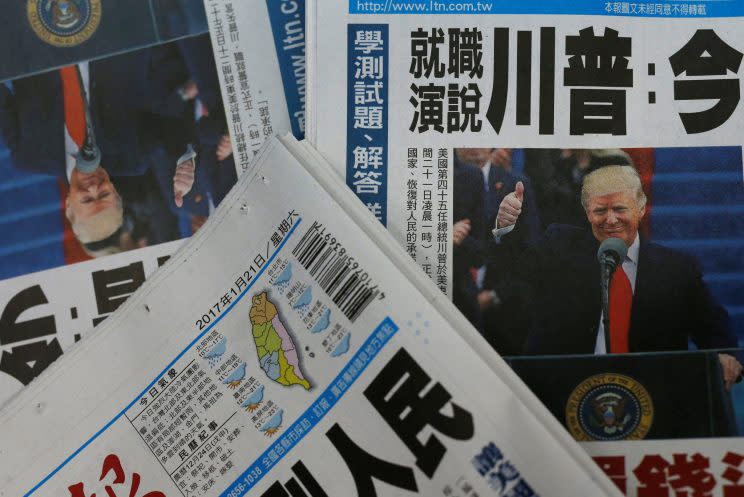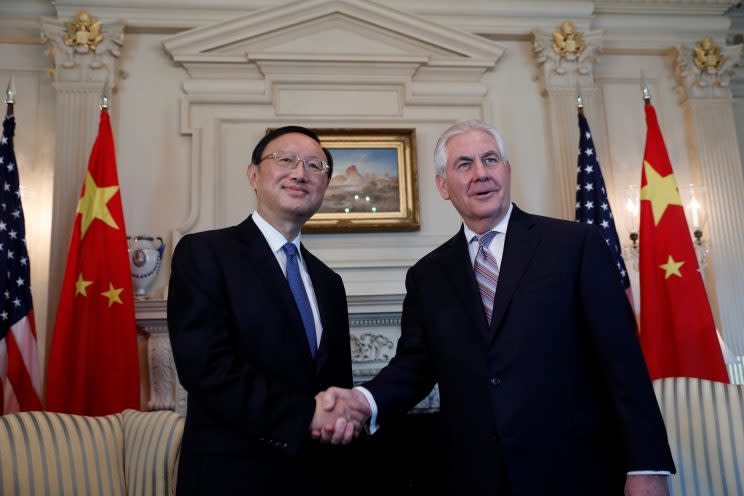After killing TPP, Trump to meet Xi, reassure allies

WASHINGTON — President Trump will host Chinese President Xi Jinping early next month, a potentially pivotal summit as the White House tries to reassure allies that the United States will stay engaged in the region after backing out of the Trans-Pacific Partnership (TPP) trade deal.
The two leaders are tentatively expected to meet April 7-8, potentially at Trump’s luxury Mar-a-Lago private club in Florida, a U.S. official confirmed on Monday. Secretary of State Rex Tillerson will lock down the exact dates on his trip to Asia this week, the official added.
Tillerson will visit Japan, South Korea and China, Wednesday through Sunday, as Washington tries to redefine its relationship with Beijing, confront North Korea and soothe the concerns of allies in China’s long and lengthening shadow.
The former oil executive is just the latest top Trump adviser to head to Asia. Defense Secretary James Mattis visited Seoul and Tokyo in early February for his first overseas trip since being sworn in. Vice President Mike Pence is “about to go” to the region as well, a senior administration official confirmed Friday. Trump himself is expected to meet again with Xi on the sidelines of the G20 summit in Germany in July.
Tillerson made Europe his first overseas destination — but while there, the top U.S. diplomat met with foreign ministers of Japan and South Korea and released a joint statement on North Korea. In the statement, Tillerson promised that the United States stood by its allies with the “full range of its nuclear and conventional defense capabilities.”
The robust diplomatic engagement reflects several factors, officials say. First, top Trump advisers know that fulfilling his campaign-trail pledge to reject TPP has unsettled allies who had hoped that the trade framework would bring the United States and its partners closer, offsetting China’s huge and growing influence.
“The president continues to believe [TPP] was the wrong approach at the wrong time,” a senior administration official told Yahoo news. “But we’re mindful that some friends in the region thought it was important.”

Another senior administration official said the parade of senior U.S. officials reflected “the need to reassure allies, especially in light of TPP and North Korea behaving very badly, and to serve notice that the U.S-China relationship is going to change.”
The official, who requested anonymity to speak candidly, said that “this is all in the early stages but there is consensus at the very top that we’re going to be more assertive and protective of American interests.”
Trump campaigned on a promise to aggressively confront China over what he described as unfair trading practices and other issues, though he has not taken concrete steps to date. “We can’t continue to allow China to rape our country,” Trump caustically declared in May of last year.
Tillerson, at his confirmation hearing, vowed to confront Beijing over its construction of artificial islands in the South China Sea. Mattis, on his trip to Asia, also promised to help Japan in its territorial disputes with China.
Tillerson’s trip will be a significant test for the secretary of state, who has earned poor reviews for not presenting the annual global human rights report in person and for missing some of Trump’s early meetings with world leaders — including one with Japanese Prime Minister Shinzo Abe — and for not taking reporters on his plane to Asia. A number of key State Department posts remain unfilled by Trump.
But he has worked behind the scenes, notably on partly patching up the U.S.-China relationship, officials say. It was his direct intervention that led Trump to agree to restate support for Washington’s longstanding “One China” policy. Under that diplomatic formula, the United States says that Taiwan is part of China, awaiting reunification by peaceful means, while Washington sells the island government weapons to fend off a potential invasion. U.S. policy on the issue was thrown into question after Trump took a direct phone call from Taiwan’s president shortly after the November election.
And now Tillerson must put the finishing touches on plans for a visit by Xi that could make the Chinese leader just the second world leader welcomed at Mar-a-Lago.
Read more from Yahoo News:
Conway defends Trump claim by citing wider domestic surveillance
‘It’s merciless’: Democrats focus on seniors while attacking GOP health bill
Rep. King touts ‘Western civilization’ while defending incendiary immigration tweet
Photos: The ‘I Don’t’ Project – A look at child marriages in India, Ethiopia and Brazil



